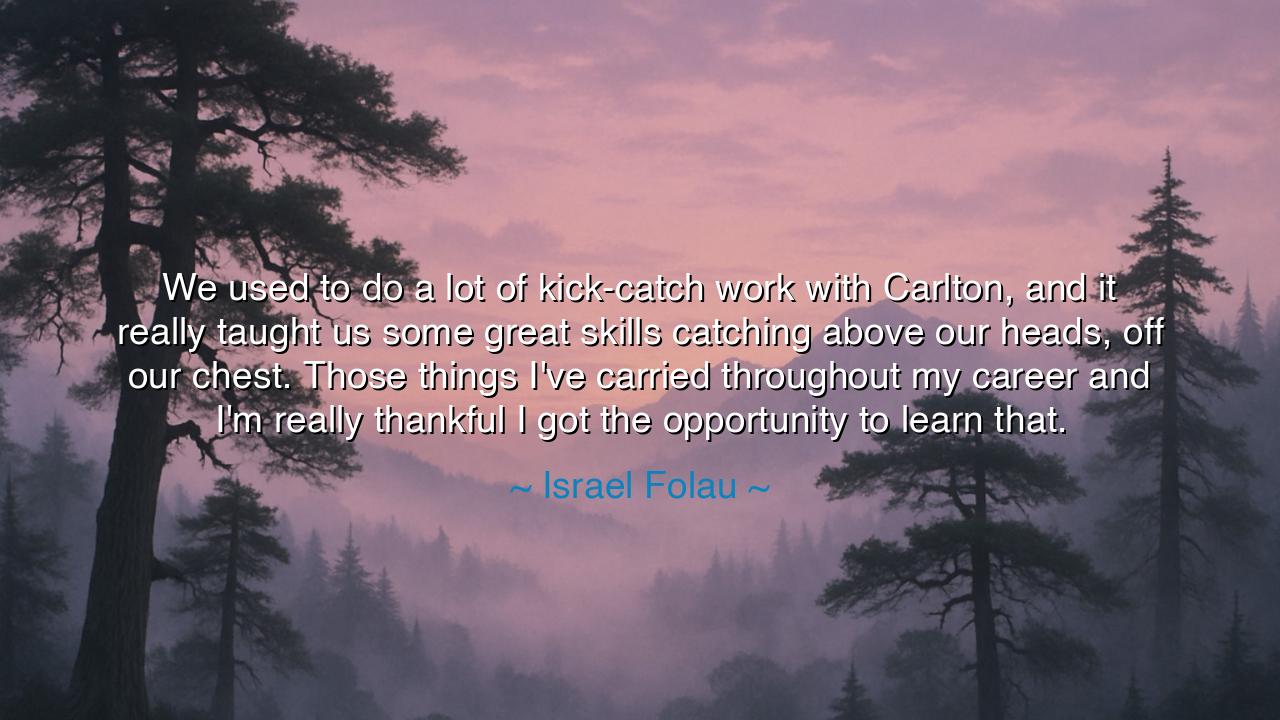
We used to do a lot of kick-catch work with Carlton, and it
We used to do a lot of kick-catch work with Carlton, and it really taught us some great skills catching above our heads, off our chest. Those things I've carried throughout my career and I'm really thankful I got the opportunity to learn that.






Israel Folau once reflected upon his journey with gratitude, saying: “We used to do a lot of kick-catch work with Carlton, and it really taught us some great skills catching above our heads, off our chest. Those things I’ve carried throughout my career and I’m really thankful I got the opportunity to learn that.” These words, though grounded in the practical training of sport, reveal a truth far deeper than the field: the importance of discipline, of learning from mentors, and of cherishing the lessons that shape one’s path.
The ancients spoke often of the necessity of skills learned in youth and carried into life. Just as a blacksmith must first master the steady grip of the hammer before crafting great swords, so must the athlete first practice the simple yet demanding drills that sharpen reflex and form. Folau’s kick-catch training may seem humble, but in those repetitions lay the seeds of greatness. For it is never the grand gesture that forms a champion, but the small, repeated actions—carried faithfully over time—that build mastery.
His mention of Carlton is a recognition of the eternal bond between teacher and student. No one ascends to greatness alone; each carries within them the voices of those who trained, guided, and believed in them. The ancients honored their mentors with reverence: Socrates passed wisdom to Plato, Plato to Aristotle, and Aristotle to Alexander. Each generation became greater because of the teachers who instilled foundations. Folau’s thankfulness to his coach echoes this same ancient truth—that honor is due to those who give us tools we could not fashion alone.
Notice also that Folau does not speak only of winning games or scoring points, but of lessons he has carried throughout his career. This is the mark of true wisdom: to see that the drills of yesterday become the habits of today, and the victories of tomorrow. The soldier who trains with the bow each dawn does not question why he draws the string again and again; in battle, when his life depends on it, he gives thanks for every morning of practice. Folau, too, looks back with gratitude, knowing that those early drills became the strength that sustained him through the fiercest contests.
History provides us with countless parallels. Consider Miyamoto Musashi, the famed samurai, who practiced with wooden swords in endless repetition. Though mocked at times for such simple exercises, those humble drills forged him into a warrior who would never be defeated. Like Folau, he understood that greatness does not appear in an instant—it is carried, brick by brick, from the foundations taught by others, and cemented by gratitude for the opportunity to learn.
The deeper meaning of Folau’s words lies in his thankfulness. Many athletes forget the small steps once they stand upon the great stage, claiming that talent alone brought them there. But Folau honors the truth: without opportunity, without teachers, without patient training, talent fades into waste. To be thankful is not simply to remember—it is to acknowledge that one’s success is a shared achievement, a chorus of effort and grace.
The lesson for us is clear. Whatever your path—whether in sport, craft, art, or life—cherish the small practices and honor the mentors who taught you. Do not despise humble beginnings, for in them lies the foundation of all greatness. Carry the skills you learn with reverence, for they will serve you not only in your career but in every trial of life. Above all, be thankful—for opportunity, for discipline, and for the hands that shaped your journey.
Practical counsel may be given. Each day, return to the basics of your craft, however simple. Show gratitude to your teachers, whether past or present. And when you achieve success, do not forget the early drills and the unseen labor that made it possible. In this way, as Israel Folau reminds us, you will not only win victories, but live with humility, carrying forward the wisdom of training, discipline, and thankfulness into every stage of life.






AAdministratorAdministrator
Welcome, honored guests. Please leave a comment, we will respond soon